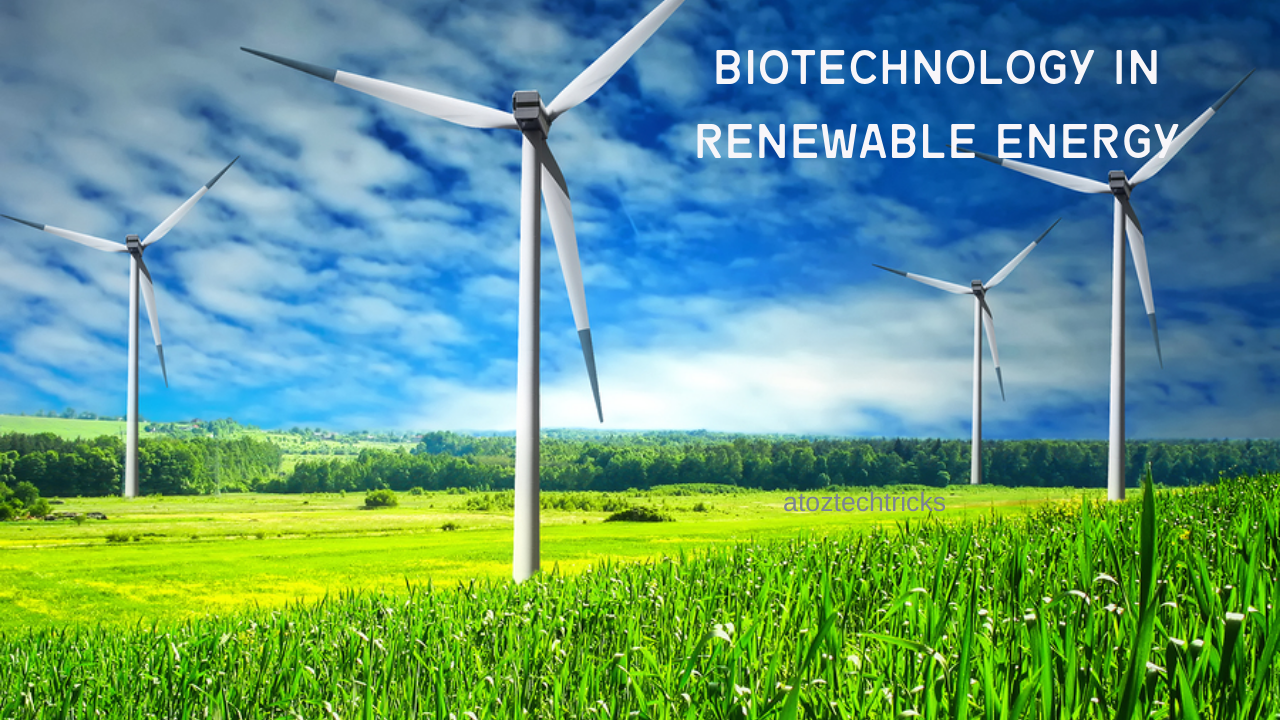Potential for Biotechnology in Renewable Energy Production
The quest for sustainable and clean energy solutions is one of the most pressing challenges of our time. With the detrimental impacts of fossil fuels on the environment and the urgent need to mitigate climate change, renewable energy sources are becoming increasingly critical. Among the various technologies being explored to achieve this goal, biotechnology stands out as a promising avenue. By harnessing the power of biological systems and processes, biotechnology offers innovative solutions for renewable energy production. This article delves into the potential of biotechnology in renewable energy, exploring its applications, benefits, challenges, and prospects.
Understanding Biotechnology in Energy Production
Biotechnology involves the use of living organisms or their components to develop or create products and processes that are beneficial to humanity. In the context of energy production, biotechnology leverages biological systems to produce renewable energy sources such as biofuels, biogas, and hydrogen. This approach not only provides alternative energy solutions but also helps in reducing greenhouse gas emissions and dependence on fossil fuels.
Biotechnology and Agriculture: Transforming the Future of Food Production
Biofuels: A Renewable Alternative
Biofuels are produced from biological materials and can serve as substitutes for conventional fossil fuels. There are several types of biofuels, including bioethanol, biodiesel, and advanced biofuels.
Bioethanol
Bioethanol is an alcohol made from fermenting sugars found in crops such as corn, sugarcane, and wheat. The fermentation process uses microorganisms like yeast to convert sugars into ethanol. Bioethanol can be blended with gasoline to create a fuel that burns cleaner than pure gasoline, reducing greenhouse gas emissions.
Recent advancements in biotechnology have led to the development of cellulosic bioethanol. Unlike traditional bioethanol, which is derived from food crops, cellulosic bioethanol is produced from non-food biomass such as agricultural residues, wood chips, and dedicated energy crops. This approach not only reduces competition with food production but also utilizes a wider range of feedstocks.
Biodiesel
Biodiesel is produced from vegetable oils or animal fats through a process called transesterification. This process converts the triglycerides in oils and fats into fatty acid methyl esters (FAME) and glycerol. Biodiesel can be used in diesel engines, offering a renewable alternative to petroleum-based diesel.
Microalgae are emerging as a significant source of biodiesel. These microorganisms have high lipid content, which can be converted into biodiesel. Algae cultivation has the potential to produce biodiesel at a larger scale with lower land use compared to traditional crops.
Advanced Biofuels
Advanced biofuels refer to next-generation biofuels that are derived from non-food feedstocks or are produced using advanced technologies. Examples include:
- Algal Biofuels: Algae can produce a variety of biofuels, including biodiesel, bioethanol, and biojet fuel. Algal biofuels are particularly promising due to their high yield and ability to grow in diverse environments.
- Biobutanol: Similar to bioethanol, biobutanol is an alcohol that can be used as a fuel. It has a higher energy density than ethanol and can be used in gasoline engines without significant modifications.
- Biohydrogen: Hydrogen produced through biological processes, such as microbial fermentation or algae-based methods, can be used as a clean fuel. Biohydrogen has the potential to be a zero-emission energy source when used in fuel cells.

Biogas: Harnessing Organic Waste
Biogas is a renewable energy source produced from the anaerobic digestion of organic matter, such as agricultural residues, food waste, and sewage. The anaerobic digestion process involves microorganisms breaking down organic materials in the absence of oxygen, producing a mixture of gases primarily composed of methane (CH4) and carbon dioxide (CO2).
Methane Production
Methane is a potent greenhouse gas, but when captured and used as a fuel, it can replace natural gas and reduce overall emissions. Biogas can be utilized for electricity generation, heating, or as a vehicle fuel. The use of biogas in combined heat and power (CHP) systems allows for the simultaneous production of electricity and heat, increasing overall energy efficiency.
Digestate Utilization
The byproduct of anaerobic digestion is called digestate, which can be used as a nutrient-rich fertilizer. This not only provides a sustainable solution for waste management but also returns valuable nutrients to the soil, promoting agricultural productivity.
The Ethics of Genetic Engineering and Gene Editing: Navigating the Moral Frontier
Biohydrogen: The Future of Clean Energy
Hydrogen is a versatile energy carrier that can be used in fuel cells to produce electricity with water as the only byproduct. While hydrogen can be produced from fossil fuels, biohydrogen offers a more sustainable alternative.
Biological Production of Hydrogen
Biohydrogen can be produced through various biological processes, including:
- Fermentation: Certain bacteria can produce hydrogen gas from organic substrates through fermentation. This process can be optimized to increase hydrogen yields.
- Photofermentation: Photosynthetic bacteria can produce hydrogen using sunlight and organic substrates. This method leverages natural photosynthesis processes to generate clean energy.
- Dark Fermentation: This process involves bacteria that produce hydrogen in the absence of light, using organic compounds as substrates. It is a promising method for continuous hydrogen production.
Applications and Benefits
Biohydrogen has several advantages, including:
- Zero Emissions: When used in fuel cells, biohydrogen produces only water and heat as byproducts, making it a clean energy source.
- Energy Storage: Hydrogen can be stored and transported efficiently, providing a solution for energy storage and grid balancing.
- Diverse Applications: Biohydrogen can be used in various applications, including transportation, power generation, and industrial processes.
Benefits of Biotechnology in Renewable Energy
The integration of biotechnology into renewable energy production offers several benefits, including:
1. Reduced Greenhouse Gas Emissions
Biotechnology enables the production of clean energy sources that emit fewer greenhouse gases compared to fossil fuels. For instance, biofuels and biogas have lower carbon footprints, helping to mitigate climate change.
2. Sustainable Feedstocks
Biotechnological processes often utilize renewable and sustainable feedstocks, such as agricultural residues, waste materials, and dedicated energy crops. This reduces the reliance on finite resources and minimizes environmental impacts.
3. Waste Utilization
Biotechnology provides solutions for waste management by converting organic waste into valuable energy products. This not only reduces waste disposal issues but also generates renewable energy.
4. Energy Independence
The development of biotechnological energy solutions can contribute to energy security and reduce dependence on imported fossil fuels. This enhances energy resilience and supports local economies.
5. Economic Opportunities
The biotechnology sector creates economic opportunities through job creation, technological innovation, and the development of new industries. It also stimulates investment in research and development.
Challenges and Limitations
Despite its potential, biotechnology in renewable energy faces several challenges and limitations:
1. Technological Complexity
Biotechnological processes can be complex and require specialized knowledge and equipment. Scaling up from laboratory research to commercial production involves technical and financial challenges.
2. Cost Competitiveness
The cost of producing biofuels, biogas, and biohydrogen can be higher compared to conventional fossil fuels. Reducing production costs and improving efficiency are critical for widespread adoption.
3. Feedstock Availability
The availability and cost of feedstocks can impact the viability of biotechnological energy solutions. Ensuring a consistent and sustainable supply of feedstocks is essential for long-term success.
4. Environmental Impacts
While biotechnology offers environmental benefits, it is important to assess the potential impacts of large-scale production. For example, the cultivation of energy crops may lead to land use changes or biodiversity loss.
5. Regulatory and Policy Issues
The biotechnology sector is subject to regulatory and policy frameworks that can vary by region. Navigating these regulations and ensuring compliance can be challenging for industry stakeholders.

Future Prospects and Innovations
The future of biotechnology in renewable energy holds exciting possibilities, with ongoing research and innovation driving progress. Some key areas of development include:
1. Synthetic Biology
Synthetic biology involves the design and construction of new biological parts, devices, and systems. This field has the potential to create customized microorganisms for efficient biofuel production and other energy applications.
2. Metabolic Engineering
Metabolic engineering focuses on optimizing metabolic pathways in microorganisms to enhance the production of biofuels and other bioenergy products. Advances in this field could lead to more efficient and cost-effective processes.
3. Integration with Other Technologies
Biotechnology can be integrated with other renewable energy technologies, such as solar and wind power, to create hybrid systems. For example, biogas production can complement solar power by providing a stable energy source during periods of low sunlight.
4. Advancements in Algae-Based Solutions
Algae-based biofuels and biohydrogen are areas of active research. Innovations in algae cultivation, genetic engineering, and processing technologies could significantly improve the viability of these solutions.
5. Circular Economy Approaches
Biotechnology can support circular economy principles by focusing on the reuse and recycling of materials. For instance, waste-derived biogas and digestate can be integrated into closed-loop systems to maximize resource efficiency.
Biotechnology offers a wealth of opportunities for advancing renewable energy production, with applications ranging from biofuels and biogas to biohydrogen. By leveraging biological systems and processes, biotechnology provides sustainable and innovative solutions that can help address the global energy challenge. While there are challenges to overcome, ongoing research and technological advancements hold promise for unlocking the full potential of biotechnology in renewable energy. As the world continues to seek cleaner and more sustainable energy sources, biotechnology will play a crucial role in shaping the future of energy production.





Post Comment